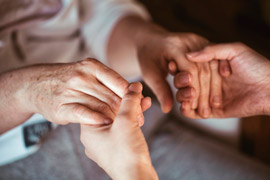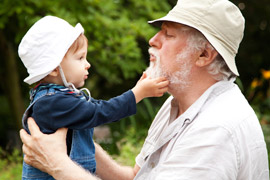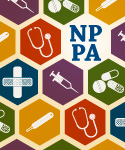February 18th, 2016
The Human-Centered Alternative
Charity Maniates, MSPA, MPH, PA-C
; [/php]/images/AU000_cmaniates.jpg)
Charity Maniates, MSPA, MPH, PA-C practices geriatric medicine in Maine.
My son was scheduled to have a myringotomy, a straightforward procedure, though it may as well have been a complicated surgery from my perspective as a worried mother. Nurses and physicians swirled in and out of our room until the nurse said, “It’s time.” Sitting in the wheelchair, I held my restless son, his favorite knitted blanket tucked around him as we traversed the brightly lit hallway to the OR. He squirmed, started to cry, and called “Dada!” over and over, desperate to leave the wheelchair.
On the outside, I was calm and reassuring, but I felt his terror and wanted to cry too. The wheelchair was locked next to the OR table. The anesthesiologist firmly pressed the tiny mask coated with grape scent and stickers around his small face; his eyes fluttered and he quickly stopped moving in my lap. A waft of the gas passed my nostrils and dissipated in the sterile OR. Carefully lifted from my lap, he was placed on the OR table and I leaned down to kiss his hand, forcing myself to leave him. As a parent, it was a terrifying experience that is now embedded in my mind forever; yet as a clinician, I knew that there was little risk for complications during the 10-minute procedure. Thankfully, the procedure went well, and my son had immediate relief the day after the tubes were placed.
The anxiety and helplessness that I felt during a straightforward procedure for my son was reflective of what my patients and families feel when receiving a new diagnosis or hearing that they need a CT scan, ultrasound or blood transfusion. As providers, our days are filled with workups, imaging, surgical procedures, and delivering news that is difficult to hear. Couching treatment options that reflect a patient-provider relationship rather than a paternalistic framework is an essential part of medicine. Asking “What are YOUR thoughts or concerns if you start this medication or have this test?” opens a conversation to explore underlying fears, clarify a misunderstanding, or broach goals of care. It’s guaranteed that elders and their families will appreciate the extra time a healthcare provider spends to actively solicit their perspectives and reach a decision together.
The emphasis on providing a play-centered environment during and after my son’s medical procedure helped the process immensely. Observing his care, I couldn’t help but think of my own patients and wish that we had geriatric life specialists to help them navigate hospital admissions and transitions to long-term care environments. There are certainly some positive changes happening in that direction. Some hospitals are now identifying patients at risk for delirium and implementing simple changes to their environments that are reducing hospital stays and improving outcomes. In the long-term care setting, where nursing homes have long been notorious as places of decline, a model called The Eden Alternative (introduced in the 1990s by a Harvard physician) focuses on elder growth rather than decline, encouraging partnerships between patients and care teams. This approach leans away from institutionalization and aims to reduce loneliness, boredom and helplessness by creating environments that are embedded with supportive, spontaneous human contact, tailored to each individual. What a refreshing, human concept!
The reality is that elders waiting for hours in the ED after a fall develop delirium, nursing homes are regimented and understaffed, and many elders are not living in safe, independent living environments. Not all elders have family or advocates. Many are alone or have family who live across the country or have limited involvement and are thus unaware of their slow decline. When an acute medical event forces their presentation in our medical systems, they are often unable to advocate for themselves, have unclear goals of care resulting in poor outcomes, and require extra community support and coordination of care.
Whether your patient is a fragile 19-month-old or a wise 98-year-old, our role as healthcare providers is to connect with a gentle human touch, to ease people’s suffering, and listen to their fears as they navigate the unfamiliar hallways of our medical institutions.
Categories: Patient Care, Policy
Tags: child life specialist, Geriatrics, health care quality, longterm care, myringotomy, patient navigation, patient-provider communication
You can follow any responses to this entry through the RSS 2.0 feed. Both comments and pings are currently closed.
7 Responses to “The Human-Centered Alternative”

NP/PA Bloggers
Elizabeth Donahue, RN, MSN, NP‑C
Alexandra Godfrey, BSc PT, MS PA‑C
Emily F. Moore, RN, MSN, CPNP‑PC, CCRN
Advanced practice clinicians treating patients in a variety of settings and specialties
Learn more about In Practice: Reflections from NPs and PAs.
-
 NEJM Journal Watch — Recent General Medicine Articles
NEJM Journal Watch — Recent General Medicine Articles NEJM Journal Watch — Recent Pediatrics and Adolescent Medicine Articles
NEJM Journal Watch — Recent Pediatrics and Adolescent Medicine Articles-
Tag Cloud
- addiction adolescent health advanced practice provider clinical role Communication compensation deep brain stimulation diagnostic test discrimination Emergency Medicine empathy end of life Falls Geriatrics gun violence Haiti healthcare access health care quality humanity intensive care intracranial aneurysm legislation lifestyle modification longterm care Massachusetts medical knowledge negotiation neurosurgery NPAEP obesity opioid abuse Parkinson's disease patient-provider communication patient navigation pediatrics performance personal growth practice privileges primary care professional title retirement running team-based health care toxic work culture Vaccination

Whenever ordering tests for the elderly we must always consider where we are going with the results. Avoid fishing expeditions with often expensive testing such as CT, MRI, nuclear cardiology. Talking gently with the patient, informing families of reasonable goals and the maintenance of dignity, and then symptomatic treatment is all that is necessary. Stay away from testing when the results require procedures that will never be done.
James, I wish that the medical community had your insights to geriatric management! I can’t agree with you more.
I found this a lucid and eloquent article, and am grateful that it is part of Journal Watch. I would only wish that such a column was authored also by physicians. I had to discover myself to be a ‘recovering medical student’, recovering from the inculcation embedded in the medical school curriculum (granted, in 1965, but change is coming only slowly), in order to understand the significance of Robert Muller’s World Health Organisation definition of good health as being ‘complete physical, mental, social and spiritual well-being’ as a guide for what medical practice should be.
When I try to talk to local nursing home administrators about ‘The Eden Alternative’, their eyes glaze over with the sheen of bureaucratic imperatives. But I keep after them, because I believe that change comes from the cumulative disruptions of concerned individuals.
Thank you for reading, Michael. You are absolutely right that system change starts with mobilization from vested individuals – providers, families, community. Although our systems are excruciatingly slow to change, the way we approach patient care matters.
I felt immediately connected to the feelings and strategies Charity believes are essential in caring for the elderly. I might only add that even 98 year olds are often “fragile” when they require hospital care. And we all hope for wisdom as part of aging. But, when we are facing our mortality, up close and personally as one would at age 98, my experience has taught me to be ready to calm fears, work diligently to address all parts of objective pain, shortness of breath, anxiety and other physical symptoms. But if I overlook the
patient’s subjective experience of “suffering” then perhaps I haven’t done all that is possible. Charity, you are wise already and that is a gift to cherish. Thank you for sharing it.
Martie, I’m glad the piece resonated with you. Your thoughts are so true. I agree that so many elders are fragile and require a tender touch just as much as children.
This is literally the first “blog post” that I’ve ever read, and I’m so glad that I did. Your words spoke to me deeply on so many levels – as a Mom, as a daughter of 90 and 93 year old parents, and as a battered but joyful nurse practitioner still totally dedicated to the art and science of caring and healing. Thank you, you inspired me – again. Much appreciated.